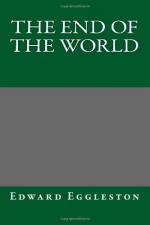Julia did not know what to say. To get a word to August was what she most desired. But the thought of using Humphreys was repulsive to her. She could not see his face in the gathering darkness, but she could feel him smile that same soulless, geometrical smile. She could not do it. She did not know what to say. So she said nothing. Humphreys saw that he must begin farther back.
“I hear the young man spoken of as a praiseworthy person. German, I believe? I have always noticed a peculiar manliness about Germans. A peculiar refinement, indeed, and a courtesy that is often wanting in Americans. I noticed this when I was in Leipsic. I don’t think the German girls are quite so refined. German gentlemen in this country seem to prefer American girls oftentimes.”
All this might have sounded hollow enough to a disinterested listener. To Julia the words were as sweet as the first rain after a tedious drouth. She had heard complaint, censure, innuendo, and downright abuse of poor Gus. These were the first generous words. They confirmed her judgment, they comforted her heart, they made her feel grateful, even affectionate toward the fop, in spite of his watch-seals, his curled mustache, his straps, his cold eyes, and his artificial smile. Poor fool you will call her, and poor fool she was. For she could have thrown herself at the feet of Humphreys, and thanked him for his words. Thank him she did in a stammering way, and he did not hesitate to repeat his favorable impressions of Germans, after that. What he wanted was, not to break the hold of August until he had placed himself in a position to be next heir to her regard.
CHAPTER XI.
THE COON-DOG ARGUMENT.
The reader must understand that all this time Elder Hankins continued to bombard Clark township with the thunders and lightnings of the Apocalypse, continued to whirl before the dazed imaginations of his rustic hearers the wheels within wheels and the faces of the living creatures of ’Zek’el, continued to cipher the world out of existence according to formulas in Dan’el, marched out the he-goat, made the seven heads and ten horns of the beast do service over and over again. And all the sweet mysteries of Oriental imagery, the mystic figures which unexpounded give so noble a depth to the perspective of Scripture, were cut to pieces, pulled apart, and explained, as though they were tricks of legerdemain. Julia was powerfully impressed, not by the declamations of Hankins, for she had sensibility enough to recoil from his vivisection of Scripture, though she had been all her life accustomed to hear it from other than Millerites, but she was profoundly affected by the excitement about her. Her father, attracted in part by the promise that there should be no marrying there, had embraced Millerism with all his heart, and was in such a state of excitement that he could not attend to his business. Mrs. Anderson was




